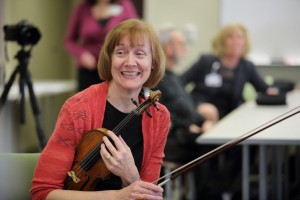
When the body is weak, and the mind wildly frightened by a fight with disease that it knows it may not conquer, music resonates.
As a thundering bass note of promise.
A lilting note of hope.
A melodic bridge between what is, and what could be.
Spectrum Health employs four board-certified music therapists and has been collaborating with the Grand Rapids Symphony to provide music therapy to patients recovering from brain injuries and strokes several times a month since 2013.
Recently, Spectrum Health added another layer of harmony when it expanded into the cancer program, courtesy of a $15,000 grant from Livestrong.
During a recent cancer transitions class at the Spectrum Health Lemmen-Holton Cancer Pavilion, seven cancer survivors sat in chairs with their eyes closed, listening to the soothing sounds of stringed instruments. Spectrum Health Music Therapist Alika Seu, in a soft voice, guided them to release their tension, from the top of their head to the tips of their fingers.
Jenison resident Karen Otto sat near the window during that session. She said she could feel her anxiety and tension melting away as she listened to the melodic notes and watched the crimson sunset inch toward the horizon.
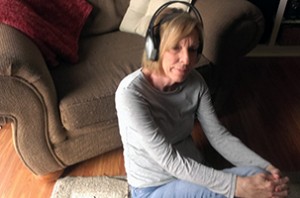
She started using song lyrics to calm down.
She said even though she had successful surgery to remove the cancer and is considered cured, the symphony session helped relax her even more.
“The whole idea of using music for something medical was not something I had really thought of before,” Otto said. “Hearing live music was powerful. You could hear every little note and hear every little string. You definitely lost yourself in the instrument if you closed your eyes.”
The symphony and music therapists also work with cancer patients during chemotherapy treatments.
“There’s been a lot of excitement in the infusion areas,” said Gerri Roobol, cancer program manager at the Lemmen-Holton Cancer Pavilion. “They talk about the relaxation and the tension just relaxing away. Some even relax to the point of being able to nap a little bit.”
Seu said when he’s taking cancer patients through guided meditation with live symphony music, he can focus solely on the patients instead of having to play music himself.
“The quality is amazing,” Seu said. “We’re very fortunate to have the symphony with us. …It quiets down the environment and brings a more human nature to what would typically be a very sterile environment.”
The program has been so successful in its opening stanzas that the Spectrum Health Foundation is seeking donors to help fund a music therapist for 10 hours a week for cancer patients.
The program also brings symphony members to the Spectrum Health Rehab and Nursing Center on Kalamazoo Avenue three times a month to play for patients who are working on cognition, speech and other stroke and brain injury issues.
The addition of symphony members has augmented the existing neurological music therapy sessions.
“They benefit greatly,” Seu said. “A lot of the patients and residents we see are very fortunate to have members of the symphony come play for them. Typically they are unable to go out to see the symphony concerts because of their disabilities.”
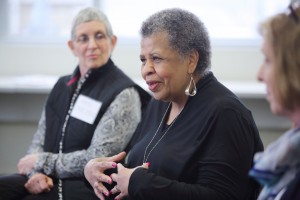
She and Spectrum Health Music Therapist Erin Wegener designed the program that is used at the Kalamazoo Avenue campus Rehab and Nursing Center and Neuro Rehabilitation Services. Wegener was instrumental in program development and expanding efforts to other Spectrum Health locations.
“Our partnership with Spectrum Health is unique because it isn’t based on another program,” McElfish Helle said. “I’m happy to say we have very high interest in the program on the part of the musicians. We have 10 musicians involved and, with very little effort, we could have 10 more tomorrow.”
McElfish Helle said when the partnership formed, members of both organizations engaged in creative improvisation.
She said symphony members didn’t necessarily expect to be playing during neuro-therapy sessions or chemotherapy treatments.
“It turned out to be something that stretched us,” she said. “It has enriched the music therapists and it has enriched the musicians.”
And most certainly it has enriched the patients themselves.
According to the American Cancer Society, music can help reduce pain, anxiety and nausea caused by chemotherapy.
Studies show that music can also lower a person’s heart rate, blood pressure and breathing rate in addition to producing a profound feeling of relaxation.
Native Americans and other indigenous people have used chanting and singing as healing rituals for hundreds of years. Greek philosophers believed that music could heal both the body and the soul.
Back in the 1940s, United States Veterans Administration hospitals used music to help treat soldiers suffering from “shell shock” and, in 1944, Michigan State University established the world’s first music therapy degree.
Former Arizona Rep. Gabby Giffords credits music therapy with helping her recover from a traumatic brain injury.
McElfish Helle said music reverberates as a popular healing tool because of its universal foundation.
“Music is always about touching people,” she said. “It’s always about feeling. This initiative is about bringing music into health care settings. It’s about touching patients, about touching their families and also about touching the people who work in a really high-stress environment.”
Otto said she was touched during her music therapy session and hopes the program plays on.
“I think it’s definitely worthwhile and definitely worth the time and money that Spectrum Health is putting into it,” Otto said. “I think it’s going to help with the healing process. I really do.”
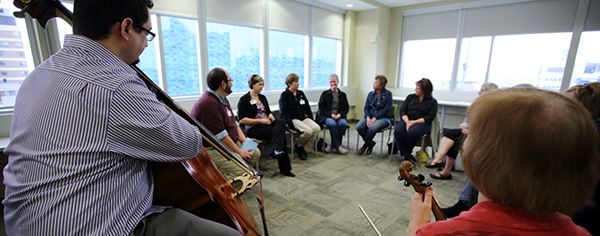 /a>
/a>
 /a>
/a>
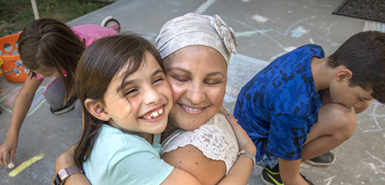 /a>
/a>